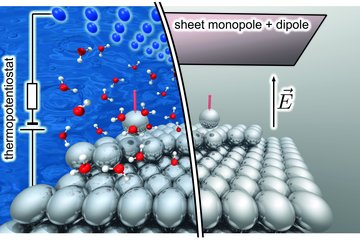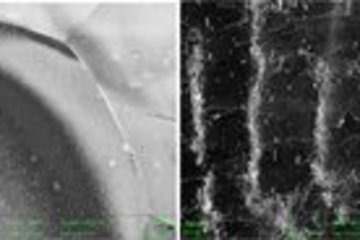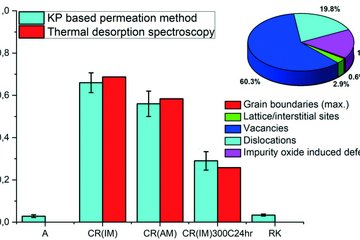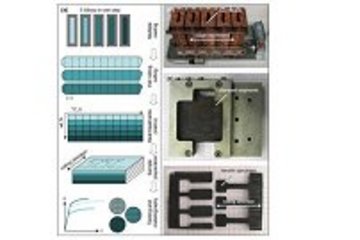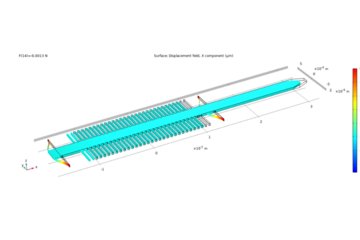All genres
521.
Thesis - PhD
Engineering Impurities in Colloidal Nanostructures used in ‘Green Hydrogen’ Generation. Dissertation, RWTH Aachen University (2021)
522.
Thesis - PhD
Development of characterization methods to improve automotive PEMFC degradation analysis. Dissertation, RWTH Aachen University (2021)
523.
Thesis - PhD
Correlation of microstructures and thermal conductivity of the thermoelectric material Ag16.7Sb30Te53.3. Dissertation, Ruhr-Universität Bochum (2019)
524.
Thesis - PhD
Characterization of aerosols and nanoparticles released during various indoor and outdoor human activities. Dissertation, RWTH Aachen University (2018)
525.
Thesis - PhD
Synthesis and in-depth electron microscopic characterization of solvothermally grown copper indium sulfide thin films. Dissertation, RWTH Aachen, Aachen, Germany (2018)
526.
Thesis - PhD
Solid state dewetting phenomena of aluminum thin films on single crystalline sapphire. Dissertation, RWTH Aachen University (2017)
527.
Thesis - PhD
The Influence of Post-Growth Heat Treatments and Etching on the Nanostructure and Properties of Rutile TiO2 Nanowires. Dissertation, RWTH Aachen, Aachen, Germany (2017)
528.
Thesis - PhD
Investigation of Sputtered Mo2BC Hard Coatings: Correlation of Nanostructure and Mechanical Properties. Dissertation, RWTH Aachen, Aachen, Germany (2017)
529.
Thesis - PhD
Investigation of alternative catalyst and support materials and their effect on degradation in high-temperature polymer-electrolyte-membrane fuel cells. Dissertation, RWTH Aachen University, Aachen, Germany (2017)
530.
Thesis - PhD
On the design of alloys and synthesis for composite steels. Dissertation, RWTH Aachen, Aachen, Germany (2017)
531.
Thesis - PhD
Fundamentals of ferrous low-carbon lath martensite: from the as-quenched, to tempered and deformed states. Dissertation, RWTH Aachen, Aachen, Germany (2017)
532.
Thesis - PhD
High Resolution Crystal Plasticity Simulations. Dissertation, Aachen Institute for Advanced Study in Computational Engineering Science (AICES), RWTH Aachen University, Aachen, Germany (2015)
533.
Thesis - Master
Scanning electron microscopy study of the microscale degradation mechanisms in polymer electrolyte fuel cells. Master, Heinrich-Heine-Universität Düsseldorf (2021)
534.
Thesis - Master
Electron microscopy degradation studies of ruthenium-platinum core-shell nanoparticles for polymer electrolyte membrane fuel cells. Master, Universitat Autònoma de Barcelona, Spain (2021)
535.
Thesis - Master
Microstructure, thermal stability and defect phonon scattering in AgSbTe2 thermoelectrics. Master, Universitat Autònoma de Barcelona, Spain (2019)
536.
Thesis - Master
Structure-property relationship studies of Pt/TiO2 nanomaterials for electrochemical applications. Master, Universitat Autònoma de Barcelona, Spain (2019)
537.
Thesis - Master
Cathodoluminescence study of lanthanide-doped oxides. Master, Heinrich-Heine Universität, Düsseldorf, Germany (2018)
538.
Thesis - Master
Synthesis Approaches to Nb3O7(OH) Nanostructures and New Studies on Their Growth Mechanism. Master, Ludwig-Maximilians-Universität, München, Germany (2018)
539.
Thesis - Bachelor
Degradation mechanisms during operation of high temperature polymer electrolyte membrane fuel cells. Bachelor, Universitat Autònoma de Barcelona, Spain (2020)
540.
Thesis - Bachelor
Effect of the processing route on the microstructure of Ag18Sb29Te53 (AST) based thermoelectrics. Bachelor, Universitat Autònoma de Barcelona, Spain (2018)






